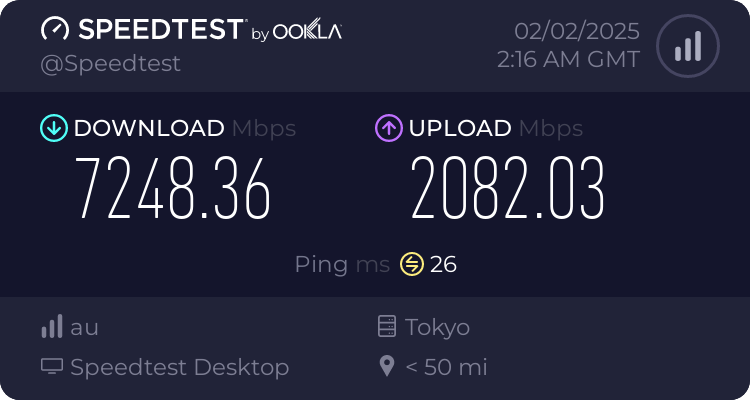Is your internet speed rigged? They want us consuming, not participating!
-
[email protected]replied to [email protected] last edited by
I should say, check your local laws.
-
[email protected]replied to [email protected] last edited by
It's more like most people are consuming and not participating so it's the way it is.
-
[email protected]replied to [email protected] last edited by
My speeds went from 940/50 to 940/35 after Altice bought out Suddenlink (Shittylink)
Then AT&T finally dropped fiber to the entire neighborhood last year and now we have 2.5gbps both ways.
Fuck cable connections, fiber is the way to go if you have the option.
-
[email protected]replied to [email protected] last edited by
If your connection is technically capable of matching upload and download speeds, you can usually just pay more for higher speeds. Basically, if you're on fiber or one of those super rare long distance ethernet connections. Synchronous fiber is more expensive (because you're getting more and planned egress data+capacity is more expensive than ingress data+capacity).
If you're on 4G/5G/coax, there are very good technical reasons why matching upload and download speeds is impractical. Possible, yes, but the total throughput of the entire network would be significantly lower, because half the network's capacity would need to be reserved just in case someone in your neighborhood is uploading a video to TikTok. Sending data to you is easy, reserving time for everyone to claim an upload slot involves spreading bits across a multi dimensional grid consisting of things like time/frequency/phase across a probability grid with grid blocks as small as 62 microseconds in size (in the time dimension). You can't set up a shared medium like that without either wasting most of the bandwidth or putting a central controller in place, with most of the bandwidth at their disposal.
Sometimes cable ISPs do alter their frequency plans to reserve more upload capacity. Often this coincides with free analog services such as radio and TV getting killed off because they're hogging important parts of the spectrum. Sometimes everyone gets a bit more latency and a bit less download capacity to accommodate for the higher upload. Most of the time you need to replace/update your modem to make use of any of the advantages and most people usually don't bother even if they could use more upload capacity.
If you're on DSL (which goes up to what, 400mbps these days?) then the ancient dark witchcraft sending more than 28.8k down a rusty old phone line specced for the late 1800s should not be questioned. Praise be to the dark lords of telecommunication for the ungodly arcane rituals those fuckers pull to send broadband internet over those lines at all.
-
[email protected]replied to [email protected] last edited by
I guess technically, yes

-
[email protected]replied to [email protected] last edited by
USAmerican here.
Business accounts usually have better uptime because that might mean money lost.
Some business ISP agreements have in them that they will give you money back if your internet is down over the rate they mentioned.
Home user agreements basically say they can cut your internet if they choose to do so for any reason.
Also business accounts can ask for a static IP address.
I don't actually know any consumer laws that protect home users more than business users. Which laws are you referring to?
-
[email protected]replied to [email protected] last edited by
Jesus Christ
-
[email protected]replied to [email protected] last edited by
It's not really "rigged". Most people don't have any use for that much outgoing bandwidth because they're not uploading that much data. They're usually downloading a lot more, though, so it makes sense to prioritize the bandwidth based on how people will actually use it. It's more than sufficient for HD video calls, which is probably the most upload-intensive task your average user is going to conduct. Giving your entire neighborhood gigabit upload speeds is a waste of resources, unless your entire neighborhood is running media servers from home.
You're still getting the bandwidth you're paying for, it's just not balanced in a way that suits your fringe use-case. Your ISP very likely has options that rebalance that bandwidth prioritization if you actually need and will use more upload bandwidth, but those are typically going to be business accounts.
Also not sure what this has to do with the Fediverse.
-
[email protected]replied to [email protected] last edited by
Leave a self empowering comment.
-
[email protected]replied to [email protected] last edited by
Also not sure what this has to do with the Fediverse.
Upload = decentralisation (federation)
-
[email protected]replied to [email protected] last edited by
What exactly are you wanting to host at home that you need super fast upload speeds, and how much traffic are you even expecting to see?
-
[email protected]replied to [email protected] last edited by
That’s most likely due to the fact that docsis dedicates most of the spectrum on the cable for download not upload since that’s what most users want. Now if those are fiber speeds maybe you have a different argument but cable networks are designed to give the most people the best experience and dedicating spectrum to upload would be a waste.
If you want to pay more, I’m sure your cable provider would give you a symmetrical cable plan for $400 a month
-
[email protected]replied to [email protected] last edited by

-
[email protected]replied to [email protected] last edited by
holy fuck what are you running, a space station?
-
[email protected]replied to [email protected] last edited by
He's slacking off at the office, obviously.
-
[email protected]replied to [email protected] last edited by
To add to this, DOCSIS (aka what cable modems use) basically has a finite number of "slots" related to the way they transmit on the line. The slots can be allocated towards either download or upload. Most ISPs weight it heavily towards download since that's what most users care about.
-
[email protected]replied to [email protected] last edited by
The A in ADSL literally stands for "asymmetric". If you want matching upload you'd use SDSL. But generally you don't want that, because it sacrifices some download speed.
-
[email protected]replied to [email protected] last edited by
You’re trying to make some kind of societal statement based on your upload speed?
-
[email protected]replied to [email protected] last edited by
Cox won’t give them out to residential addresses.
-
[email protected]replied to [email protected] last edited by
That’s just how modems are designed. DOCSIS consumer cable modems allocate about 10× download bandwidth vs upload. Many cable companies further cap upload speeds, probably because most people don’t demand that much. People aren’t complaining, so they aren’t giving more.



